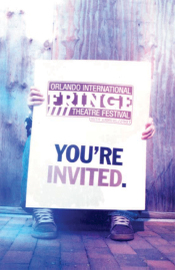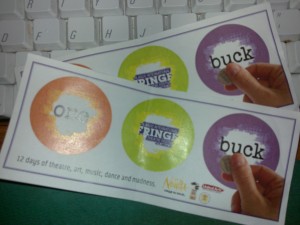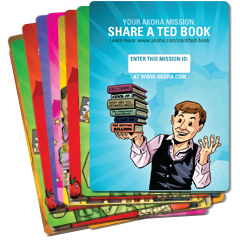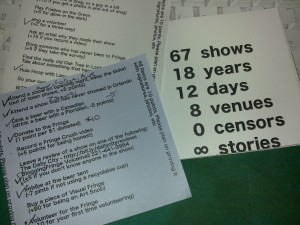Yes, it's true. I can never shut up about the Orlando Fringe. Fringe is what BarCamp will be in 50 years, becuase they have the same humble beginnings. Actually, if you take Internet Years into account, we are more like 3 or 5 years away from having unconferences that last 2 weeks and appeal to a wide audience. (I know because I want to create one)
[caption id="attachment_743" align="alignleft" width="175" caption="photo from orlandosentinel.com"] [/caption]
[/caption]
Of the 67 shows at this year's Orlando festival, a majority are from out-of-town (USA or International), OR have never appeared at the Fringe before. The festival is spread across 8 venues in Loch Haven Park, so everything is within walking distance. The proximity of the venues, along with the staggering quality of all the shows, makes this one of the premier unjuried theatre festivals in the world.
Half of Orlando has no idea this is happening. It's even worse for tourists.
Fringe has been going on for 18 years, longer than any other US fringe, longer than the crappy Music Festival, and just as long as the Film Fest.
On top of all these things, 100% of ticket sales go directly in the artists' pockets. No exeptions, substitutions or refunds. The only things the festival makes money on is the Button (everyone must buy one, $8), merchandise, Beer and Wine, and Donations. A huge part of their budget comes from Grants and Donations. They have several full-time and part-time staff. (donate something, yo)
Happy Hour Monday
If you've EVER read this blog before you'll know I wrangle the herd of cats known as Florida Creatives. Well, once a year I try to inspire this group (you can't tell these kids what to do, just suggest) to make the pilgrimage to Loch Haven Park with me and drink beer 3 miles from their normal gathering place. Last year, we enjoyed some marginal success, and one guy actually came to see a show with me! I know a few other folks came out on the weekends, brought their kids. Good thing too. Fringe has a great family atmosphere if you're looking for it.
Blogging Fringe
I love this festival so much, I go there every day for 2 weeks, and I started an entire project (I don't think of it as just a website any more) where I blog about Fringe, take photos, make videos, and try to inspire people to do the same.
The big change this year is I'm not really trying to aggregate anything, just evangelize. The most I've really done to that end is to try and filter twitter posts about Orlando Fringe, which grows in complexity (and annoyingness) all the time. The coolest thing about the recipe I've built is that it works with the global twitter community, which is still fairly easy to navigate. I can't say the same of the blogosphere, especially since so many people are posting to private Facebook and MySpace accounts. The openness of twitter (which almost sounds like a joke) is a strength I am exploiting, and I'm trying to wield in a meaningful and usable way. Not everyone uses Twitter Search or TweetDeck, so I made one for them.
Herding theatre patrons
This year marks the 4th festival since I started doing Blogging Fringe, and I don't feel as though I've gotten very far in getting other people to blog on my site. So this year I wanted to let them create content where they are most comfortable, and have them act as advocates for something bigger than Blogging Fringe or even a single instance of the Orlando festival.
We're talking about the community.
Just as with my love for Drupal, your reasons for staying at Fringe are not always the same ones that made you come in the first place.
Normally, a friend will drag you to some show or other, or perhaps you know someone in a show, or a second- or third-degree friend is in that situation. At Fringe, the Kevin Bacon game is too easy. The circle is much smaller and the bonds are often stronger. There are plenty of people I only know during Fringe, because they live in Seattle, Canada, or the UK. I have actually taken one of these Fringe Friendships to the next level, by visiting some actor friends up in New York a few years ago.
Just like making friends online, sometimes Fringe Friends can become your friends in Real Life. This is sometimes true of locals, but not often.
Another crazy thing is that this village only comes together for two weeks. I've heard similar things about Burning Man. Another characteristic they share is a Gift Economy.
Whuffie at the Fringe
Orlando Fringe has an invention they call "Fringe Bucks", which is a social currency you can touch. When you volunteer for Fringe, you get 1 Fringe Buck per hour. 4 Fringe Bucks gets you into a show, for free. Your used Fringe Bucks then go to artists, who in turn use their Fringe Bucks to get into other shows. Artists also often "comp" their friends and other artists. Up to 10% of any show is filled with people who didn't pay money to be there.
[caption id="attachment_744" align="alignleft" width="300" caption="Fringe Bucks"] [/caption]
[/caption]
Volunteers also get a free Button, so if you are willing to spend time at Fringe (which is natural for many people), you can get into all the shows you want, for free, within reason.
I was reminded of Fringe Bucks when I read Down and Out in the Magic Kingdom, and learned Cory Doctorow's wild theory that someday money will be based on meritocracy. He called this new Social Capitol "Whuffie", coining a term that has started a movement in social media marketing. Tara Hunt has even gone so far as to write a book about Whuffie. It's called The Whuffie Factor: Using the Power of Social Networks to Build Your Business
, and I can't wait to read it.
Printing Money, Whuffie Style
Other than volunteering, several other ways exist to earn social capitol at Fringe. "Hug a volunteer", is a mantra that's heard and acted on often. Billeting artists (giving them a place to sleep) actually earns you a SuperPass, which gets you in to any show for free. Buying someone a beverage at the Beer Tent is often proffered as a reward for a favor, a free ticket to a show, or just as an excuse to get some face-time with your favorite artist.
My mission this year was to try and capture some of that implicit social capitol and have everyone make the festival better by participating in a game. I often describe it as a scavenger hunt, but it's not really correct to call it that.
I was inspired by Akoha, which is a game where you are given a physical card with a unique "Mission ID" or a deck of missions, and the whole thing is tracked online. The idea is to "play it forward". One card will pass from person to person, as you perform small kindnesses to other people, making the world a better place.
[caption id="attachment_742" align="alignleft" width="240" caption="Akoha at TED"] [/caption]
[/caption]
The Game Itself
Each participant gets a small booklet containing a piece of paper with several "challenges". Some of these are easier than others, but initially they were designed to be things you could do for free, and especially to generate a story you could then tell to others. The best one so far was a bizarre hula-hooping mishap... involving a girl wearing a skirt.
[caption id="attachment_745" align="alignleft" width="300" caption="The Game, Manifested"] [/caption]
[/caption]
Each mission is worth 10 points, with modifiers for fun reasons.
- Drink a beer with a Canadian (drink a beer with a Floridian, -5 points)
- Donate to the Fringe (1 point per $1 donated)
... and so on.
In order to get players engaged right away, I invented the idea of your first mission being something you'd have to carry out right away, with two added bonuses:
- The First Mission always involves a 3rd party, who has not yet started playing the game.
- You must convince said 3rd party to complete your mission without speaking to them.
This makes the first challenge, well, challenging, and gets you from zero to one as a player right away. Now, you also have to explain to your friend what the heck you just did when the mission is over, thereby spreading the game virally.
Choose Your Own Adventure
I had originally wanted to do this game more like Akoha, with an online registration for missions, players and points. Anyone could create a mission, assign a mission to someone, or gift points in recognition of "going above and beyond". It would turn everyone into a facilitator of the game, and in a perfect world, it would have been great.
In the end, I chose to use paper and online photos as the medium, because it's more accessible and there's a lot less overhead (this is a free time project).
Any player is still invited to invent their own challenges, either by having me write them down, or by printing out their own sheets. You just need a 4 1/4" square piece of paper, and you can write anything on it.
Artists often use printed fliers to promote their shows, so I thought this would be a good chance to make the fliers useful beyond just saying the show times. Now every flier you hand out is interactive and viral, and it inspires your patrons to share something related to your show.
We have designed a platform.
Measuring Success
As players are encouraged to use whatever platform is most comfortable for them (Flickr, Facebook, MySpace, etc.), measuring will be just as difficult as with most social media campaigns. My Blogging Fringe twitter bot helps a bit, and Google Alerts help a bit more, but the only (simple) way to be able to see all these posts will be to have all these people add me as a friend on the relevant network and look at their Activity Streams.
This is where open standards would really help. They could make aggregating this content easy, but Facebook and MySpace are inherently closed to the average Joe, and that's me.
Luckily I know most of these people, or I'm getting to be Fringe Friends with them. In the future, scaling this game will be hard without a centralized web site to collect all the data, but for this year's experiment, what we've got isn't bad for the amount of time and money I put in to it.
The Goal
In coming up with my presentation for BarCamp, I stumbled across the mission for Blogging Fringe. Even though I had done it for 3 years prior, I couldn't verbalize fully and succinctly why I was doing it. I came up with the following:
[caption id="" align="aligncenter" width="240" caption="To inspire entertaining and unexpected interaction between patrons of the arts, artists and arts organizations."] [/caption]
[/caption]
Everything I generate now for this project and future iterations of Blogging Fringe will take this statement into account, and give me the razor-edged accuracy I need to make this free time project greater than the sum of its parts.
There's a lot I haven't covered here, but that's the way with this project, it really is quite deep and nebulous. It took me more than 3 years to understand it, and I feel like I'm learning and re-learning new things all the time.
I'd love your feedback, or stories about similar campaigns. This will definitely come up in a future podcast, BlogOrlando, BarCamp or other session. I'd love to know what others can learn from my experimentation, and how I can make this project even better.
Commenting on this Blog post is closed.